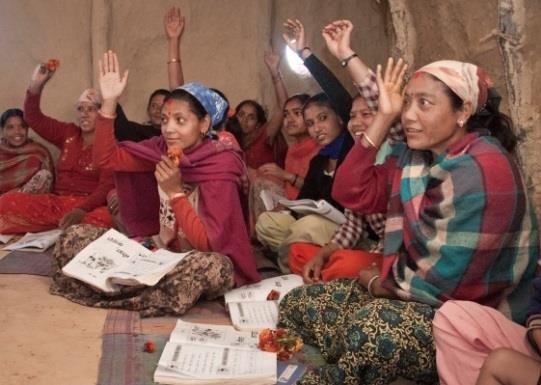
Nepal struggles with a severe food deficit which has been made worse by the recent devastating earthquake in April 2016. With an average income per capita of $700, Nepal remains one of the poorest countries in South Asia, with about 25 percent of the population living below the international poverty line of $1.25 a day. According to the Nepal Demographic and Health Survey 2011, the rate of stunting among under-five children is 41 percent and underweight is 29 percent, reflecting widespread chronic malnutrition. Although the problem of under-nutrition is pervasive across Nepal, the national aggregates fail to reflect the widespread disparities that exist across socioeconomic groups and ecological regions.
Previous and ongoing USAID projects in agricultural development and food security substantiate the direct link between education and economic empowerment. However, three-quarters of Nepali women are unable to read and write, making the illiteracy rate in Nepal one of the highest among low-income countries. There is consistent and compelling evidence to suggest that when the status of women is improved, agricultural productivity increases, poverty is reduced and nutrition within the family improves. Training in life skills, such as entrepreneurship, literacy, basic math, basic health and nutrition, when combined with training in agriculture, leads to even stronger, more sustainable results. USAID’s Business Literacy project seeks to build on previous efforts and expand on integrated trainings that empower women and marginalized communities.
PROJECT OVERVIEW
USAID’s three-year, $4 million Business Literacy Project, is part of the U.S. Government’s Feed the Future Initiative in Nepal. The project seeks to achieve the Initiative’s goal of ‘increased resilience of vulnerable communities and households' by enabling access to agricultural and nutrition interventions and business opportunities for women, youth, disadvantaged castes, and ethnic minorities. The project targets 48,000 beneficiaries in USAID’s 20 focus districts and builds skills in literacy and numeracy, nutrition knowledge, life skills, entrepreneurship and access to finance.
The project works closely with the Government of Nepal’s Non-Formal Education Centre, District Education Offices and Village Development Committees. It also coordinates with other ongoing USAID projects including Knowledge-based Integrated Sustainable Agriculture and Nutrition (KISAN), Suaahara, Health For Life and Sajhedari Bikaas.
PROJECT ACTIVITIES
Developing business literacy training materials
- Literacy and Numeracy: 16 weeks focused on basic reading, writing, and math skills.
- Nutrition Education: Four weeks focused on basic nutrition, hygiene, maternal and child health care, sanitation and food safety education.
- Life Skills: Eight weeks focused on HIV/AIDS, disaster risk reduction, floods, earthquakes or fires, and human trafficking.
- Entrepreneurial Skills: 16 weeks focused on agriculture and livestock.
- Access to Finance: Four weeks focused on common loan terms and interest rates.
- Module Guide Book Set: One set for each module to facilitate community trainers to run the classes.
- Training of Trainer’s Manual to guide master trainers to conduct training of trainers.
Developing trainers
- Select and build the capacity of 150 master trainers and 2,000 community trainers.
Delivering business literacy training
- Organize 48 weeks of training for 48,000 beneficiaries.
KEY RESULTS
Till 2015, the project:
- Benefited 32,641 rural households.
- Trained over 32,000 people on child health and nutrition, improving agricultural productivity, life skills, entrepreneurship skills, etc.
- Assisted 82.75% beneficiaries to open a savings account or insurance policy
- Assisted 70% beneficiaries to expand entrepreneurial activities
- Improved adult literacy rate, especially among women







Comment
Make a general inquiry or suggest an improvement.